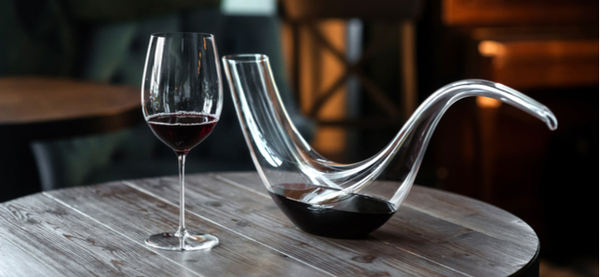Unlike the decanting cradles used ages ago, today you don’t need to decant most wines. However, what about the sediments that are often seen at the bottom of many red wines?
Read on to explore the meaning and function of decanting. Also included are how to use a decanter, which wines should be decanted, and wine clubs where you can buy reliable vessels
What Is a Decanter?
By definition, the vessel used for decantation of liquid is called a decanter. This is typically a glass vessel used to collect the sediment of wines and other liquids, while carafes are aesthetically-pleasing bottles for serving wine.
This vessel can enhance the taste, body, and shelf life of your wines as you can see below.
- Decanting removes sediments often seen in aged wine bottles.
- Aeration or the process of letting the wine bottle breathe sometimes helps to change the peculiar smell of wines.
- Decanting will mellow the wine and soften its flavors.
- Aesthetics of the wine bottle may not be as appealing as a sculpted crystal vessel on the anniversary dining table.
- If you have opened a corked bottle of wine, a decanter can be used to store the wine for longer periods.
How Do You Use a Decanter?
Here’s how to use this special vessel for improving the flavor and appearance of your aged wines:
- Set the bottle horizontally or vertically based on preferences for 24 hours before serving.
- Remove the cork or closure.
- Clean the mouth of the wine bottle.
- Light up a candle at a convenient spot underneath where you intend to pour the wine.
- Pour the wine at a slow pace.
- Watch the transparency of the wine you’re pouring.
- Stop pouring when you see sediments.
Waste the rest up to two ounces.
Which Wines Should Be Decanted?
Take a look at the list of wines that should and shouldn’t be decanted.
- Old and young red wines often will have a lot of sediment at the bottom of the bottle to decant.
- Old red wines and rosés don’t need decanting and if you try to decant them further, it might get oxidized easily.
- Decanting is ideal for wines such as Vintage Ports, Aged Bordeaux, Malbec, Shiraz, Cabernet Sauvignon, and Burgundy to separate the sediment.
- Barrel-aged wines are often seen with sediments unlike oak or steel aged.
- Cold-climate grape grown wines are tastier when left open for a few hours before serving.
Wine Decanting Myths
The following will help you separate fact from fiction when it comes to decanting wine.
- All wines should be decanted: False. Not all wines need to be decanted as aforementioned and a good swirl is all you need for aerating most wines.
- Decanting can be used to remove the rotten egg smell: True. The rotten egg aroma is the telltale sign of hydrogen sulfide and you can stabilize the wine after an hour inside the vessel.
- All decanters are safe: False. When lead crystal is used in this type of vessel, it often bleeds into the wine when stored for long periods.
- Decanting for one hour is sufficient: It’s variable. While old wines may only take 30 minutes, younger wines might need up to 2 hours.
Where To Buy A Decanter
These vessels are useful and affordable. Here are the top wine clubs where you can find them online:
Gold Medal Wine Club
A club selection item, you’re getting an engraved crystal decanter from GMWC at $49 for one and $147 for three vessels. The exquisite shape and texture makes it a must-have accompaniment for your wine collection.
Winc
If you want the ultimate vessel set for your organic wine or white wine collection, Winc’s Wine Collector’s Kit is the perfect thing at $135. It has a gorgeous and sturdy decanter from Riedel, but also comes with three Riedel glasses and a Garçon corkscrew.
Bottom Line
Whether you’re drinking red wine or vegan wine, a decanter can do much more than just catch the sediment. It aerates old and young wines, besides letting it breathe or change the smell. Try it out for yourself to see the results with a promising selection of wines from an online wine club.
